七下英语知识点归纳
人教版七年级英语下册各知识点归纳总结
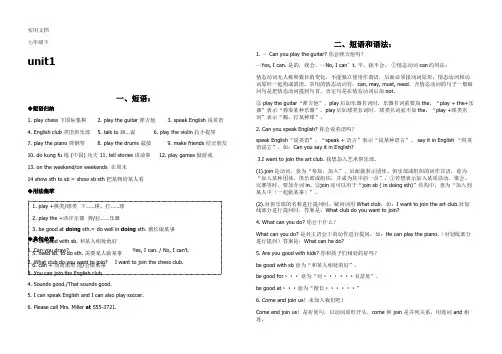
七年级下unit1一、短语:◆短语归纳1. play chess 下国际象棋2. play the guitar 弹吉他3. speak English 说英语4. English club 英语俱乐部5. talk to 跟…说6. play the violin 拉小提琴7. play the piano 弹钢琴8. play the drums 敲鼓9. make friends 结交朋友10. do kung fu 练 (中国) 功夫 11. tell stories 讲故事 12. play games 做游戏13. on the weekend/on weekends 在周末14 show sth to sb = show sb sth 把某物给某人看◆用法集萃◆典句必背1. Can you draw? Yes, I can. / No, I can’t.2. What club do you want to join? I want to join the chess club.3. You can join the English club.4. Sounds good./That sounds good.5. I can speak English and I can also play soccer.6. Please call Mrs. Miller at 555-3721.二、短语和语法:1. — Can you play the guitar? 你会弹吉他吗?—Yes, I can. 是的,我会。
—No, I can’t. 不,我不会。
①情态动词can的用法:情态动词无人称和数目的变化,不能独立使用作谓语,后面必须接动词原形,情态动词和动词原形一起构成谓语。
常用的情态动词有:can, may, must, need。
含情态动词的句子一般疑问句是把情态动词提到句首,否定句是在情态动词后加not。
七年级下册英语必背知识点
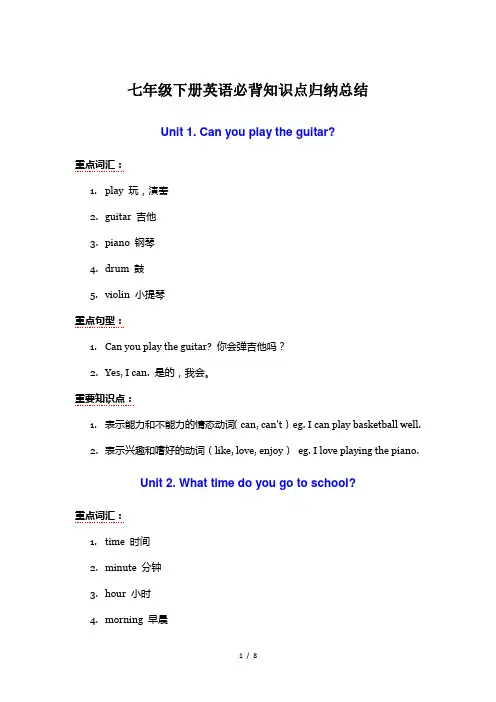
七年级下册英语必背知识点归纳总结Unit 1. Can you play the guitar?重点词汇:1.play 玩,演奏2.guitar 吉他3.piano 钢琴4.drum 鼓5.violin 小提琴重点句型:1.Can you play the guitar? 你会弹吉他吗?2.Yes, I can. 是的,我会。
重要知识点:1.表示能力和不能力的情态动词(can, can't)eg. I can play basketball well.2.表示兴趣和嗜好的动词(like, love, enjoy)eg. I love playing the piano.Unit 2. What time do you go to school?重点词汇:1.time 时间2.minute 分钟3.hour 小时4.morning 早晨5.afternoon 下午6.evening 晚上重点句型:1.What time do you get up? 你几点起床?2.I usually go to school at 7:30. 我通常七点半去上学。
重要知识点:1.表示时间的问答方式和用法eg. What time is it now? It's half past eight.2.表示日常生活习惯的一般现在时eg. I usually do my homework afterschool.Unit 3. How do you get to school?重点词汇:1.bike 自行车2.walk 步行3.bus 公交车4.subway 地铁5.taxi 出租车重点句型:1.How do you get to school? 你怎么去上学?2.I usually take the bus. 我通常坐公交车。
重要知识点:1.表示交通工具的名词和用法eg. I ride a bike to school every day.2.表示方式的副词和表达方式eg. He walks to work every morning.Unit 4. Don’t eat in class.重点词汇:1.don't do sth. 不要做某事2.eat 吃3.drink 喝4.talk 谈话5.listen 听6.music 音乐重点句型:1.Don't talk in class. 上课时不要讲话。
七年级下英语知识点大全
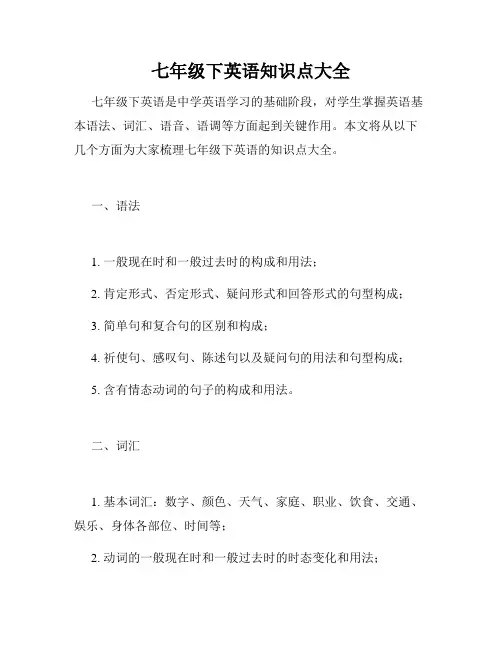
七年级下英语知识点大全七年级下英语是中学英语学习的基础阶段,对学生掌握英语基本语法、词汇、语音、语调等方面起到关键作用。
本文将从以下几个方面为大家梳理七年级下英语的知识点大全。
一、语法1. 一般现在时和一般过去时的构成和用法;2. 肯定形式、否定形式、疑问形式和回答形式的句型构成;3. 简单句和复合句的区别和构成;4. 祈使句、感叹句、陈述句以及疑问句的用法和句型构成;5. 含有情态动词的句子的构成和用法。
二、词汇1. 基本词汇:数字、颜色、天气、家庭、职业、饮食、交通、娱乐、身体各部位、时间等;2. 动词的一般现在时和一般过去时的时态变化和用法;3. 常用介词、副词、形容词、代词、连词等的用法;4. 重点词汇:名词、动词、形容词、副词等的辨析;5. 常用短语和惯用语的用法和意义。
三、语音1. 英语元音、辅音的发音方法及发音区别;2. 重音、轻音的区别及在不同单词中的应用;3. 连读、缩读、语调等基本语音技巧的运用。
四、阅读1. 了解文章结构和主旨;2. 阅读理解的基本方法和技巧;3. 文章中的重点句型和重点词汇;4. 不同类型文章的写作风格和特点。
五、写作1. 熟悉英语的基本句型;2. 如何遣词造句地表达自己的观点;3. 写作技巧和写作准则;4. 书信格式、邮件格式、短文格式等不同类型写作的特点和要求。
六、听说1. 听力技巧和训练方法;2. 默写、听音辨词、听音辨意训练;3. 听力材料的种类和来源;4. 口语练习、语音训练等讲练结合的技巧。
以上就是七年级下英语知识点大全,每个知识点都是相互关联的,只有融会贯通,才能在英语学习中更快地进步。
在学习过程中,一定要注重日积月累,努力掌握基础知识,打牢英语学习的基础。
七下英语语法知识点归纳总结
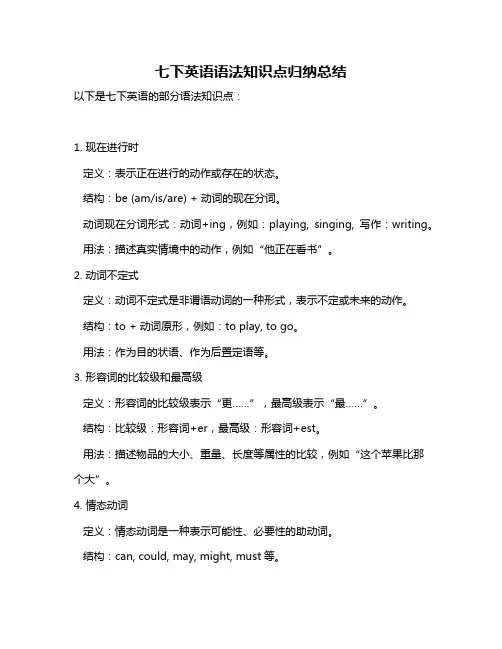
七下英语语法知识点归纳总结以下是七下英语的部分语法知识点:1. 现在进行时定义:表示正在进行的动作或存在的状态。
结构:be (am/is/are) + 动词的现在分词。
动词现在分词形式:动词+ing,例如:playing, singing, 写作:writing。
用法:描述真实情境中的动作,例如“他正在看书”。
2. 动词不定式定义:动词不定式是非谓语动词的一种形式,表示不定或未来的动作。
结构:to + 动词原形,例如:to play, to go。
用法:作为目的状语、作为后置定语等。
3. 形容词的比较级和最高级定义:形容词的比较级表示“更……”,最高级表示“最……”。
结构:比较级:形容词+er,最高级:形容词+est。
用法:描述物品的大小、重量、长度等属性的比较,例如“这个苹果比那个大”。
4. 情态动词定义:情态动词是一种表示可能性、必要性的助动词。
结构:can, could, may, might, must等。
用法:表示可能性,例如“他可能在这儿”;表示必要性,例如“你必须快点儿”。
5. 一般将来时定义:表示未来的动作或状态。
结构:will + 动词原形,例如:will go, will be。
用法:描述未来的计划、安排等,例如“明天我将要去公园”。
6. 一般现在时定义:表示现在的动作或状态。
结构:动词原形,第三人称单数形式为动词+s/es。
用法:描述日常习惯、事实等,例如“我每天早上跑步”。
7. 现在完成时定义:表示过去的动作对现在的影响或过去的动作持续到现在。
结构:have/has + 过去分词。
用法:描述已经完成的动作或状态,例如“我已经完成了作业”。
8. 时间介词和连词表示时间的介词:at, on, in;before, after;since等。
表示时间的连词:when, while等。
用法:描述时间关系,例如“我在上学的时候去了北京”。
9. 宾语从句和定语从句宾语从句:放在动词或介词后面的句子,充当宾语。
七年级下册英语语法知识点归纳总结
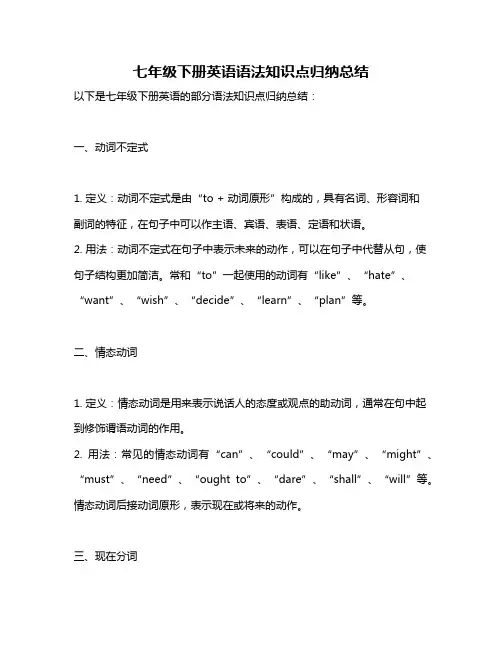
七年级下册英语语法知识点归纳总结以下是七年级下册英语的部分语法知识点归纳总结:一、动词不定式1. 定义:动词不定式是由“to + 动词原形”构成的,具有名词、形容词和副词的特征,在句子中可以作主语、宾语、表语、定语和状语。
2. 用法:动词不定式在句子中表示未来的动作,可以在句子中代替从句,使句子结构更加简洁。
常和“to”一起使用的动词有“like”、“hate”、“want”、“wish”、“decide”、“learn”、“plan”等。
二、情态动词1. 定义:情态动词是用来表示说话人的态度或观点的助动词,通常在句中起到修饰谓语动词的作用。
2. 用法:常见的情态动词有“can”、“could”、“may”、“might”、“must”、“need”、“ought to”、“dare”、“shall”、“will”等。
情态动词后接动词原形,表示现在或将来的动作。
三、现在分词1. 定义:现在分词是动词的一种形式,具有形容词的特征,可以表示正在进行的动作或状态。
2. 用法:现在分词可以作定语、表语和状语。
常和“-ing”一起使用的动词有“seeing”、“feeling”、“thinking”、“doing”、“being”等。
四、介词短语1. 定义:介词短语是由介词和名词或代词构成的短语,用来表示时间、地点、方式等。
2. 用法:介词短语在句子中可以作状语、定语和表语。
常见的介词有“in”、“on”、“at”、“for”、“with”、“by”等。
五、连词1. 定义:连词是用来连接两个句子或从句的词语,表示它们之间的关系。
2. 用法:常见的连词有“and”、“but”、“or”、“so”、“because”、“if”等。
连词在句子中起到承上启下的作用,使句子的意思更加清晰。
以上是七年级下册英语的部分语法知识点归纳总结,希望对你有所帮助。
七年级英语重点下册知识点归纳
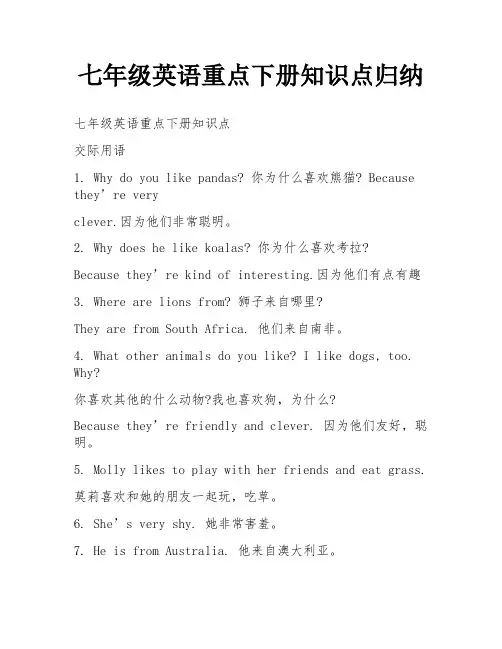
七年级英语重点下册知识点归纳七年级英语重点下册知识点交际用语1. Why do you like pandas? 你为什么喜欢熊猫? Because they’re veryclever.因为他们非常聪明。
2. Why does he like koalas? 你为什么喜欢考拉?Because they’re kind of interesting.因为他们有点有趣3. Where are lions from? 狮子来自哪里?They are from South Africa. 他们来自南非。
4. What other animals do you like? I like dogs, too. Why?你喜欢其他的什么动物?我也喜欢狗,为什么?Because they’re friendly and clever. 因为他们友好,聪明。
5. Molly likes to play with her friends and eat grass.莫莉喜欢和她的朋友一起玩,吃草。
6. She’s very shy. 她非常害羞。
7. He is from Australia. 他来自澳大利亚。
8.He sleeps during the day, but at night he gets up and eatsleaves.他白天睡觉,但是晚上他会起来吃叶子。
9.He usually sleeps and relaxes 20 hours every day.他通常每天睡觉休息20个小时。
10.Let’s see the pandas first. 让我们先看熊猫。
11.Why do you wantto see the lions?你为什么想去看狮子七年级英语重点下册知识点总结一. 动词be(is,am,are)的用法我(I)用am, 你(you)用are,is跟着他(he)、她(she)、它(it)。
2024-2025学年外研版(2024)七年级英语下册+Unit+2+知识点总结(单元复习课)
2024新外研版七年级英语下册第2单元【Go for it】知识点总结(单元复习课)一、主要词汇however(然而)still(还,仍然)metre(米,公尺)line(线)breath(呼出的气;吸入的气)would(会)stomachache(胃痛;肚子痛)shall(要不要……?)either(两者中的任何一个)choice(选择;选择权)seem(看来,似乎,好像)someone(某人,有人)neither(两者都不的;两者中无一的)cheer(为……欢呼,喝彩;为……加油)cross(穿过,越过,跑过)lifelong(终身的,毕生的)dream(梦想,愿望,理想)past(经过)record(记录,记载)none(全无,没有一点)member(成员)moment(某一时刻)if(假若,要是,如果)possible(可能的,可能做到的,可能实现的)purpose(目的,意图)raise(筹集;筹募)charity(慈善事业)encourage(鼓励,激励)teach(教)note(笔记)during(在……期间)consider(考虑,细想)both(两者,双方,两个都)as(在某一年龄段时)shark(鲨鱼)attack(袭击,殴打,破坏)nearly(几乎,差不多,将近)die(死去,死亡)competition(比赛)compare(相比较;可媲美)achievement(成绩;成就)ride(漂浮)lover(爱好者)gold(金质的)medal(奖牌;勋章)fit(健壮的,健康的)final(决赛)team(游戏或体育比赛的队)even(甚至)worse(更严重地;更厉害地)continue(继续)brave(勇敢的,无畏的)action(行为)fight(努力争取;为……斗争)score(在运动、比赛或考试中得(分))goal(进球;进球得分)victory(胜利,成功,赢)lead(带路,领路;引领)international(国际的)chance(机会)improve(改善,改进;变得更好)create(创造)wonder(想要知道)success(成功,胜利,成就)explain(解释,说明)simple(单纯的,纯粹的,完全的)same(相同的,同一个的)courage(勇气,胆量,勇敢)ahead(在前面)spirit(某一特定历史时期、地方或群体的精神,风气)last but not least(最后但同样重要的)marathon(马拉松赛跑)surf(冲(浪))sink(下沉,沉没)surfer(冲浪者)confident(有信心的,自信的)surfboard(冲浪板)二、重点短语Go for it(全力以赴,勇敢尝试)The benefits of sports(体育运动的益处)How do you like sth?(你认为……怎么样?)the origin of sports(体育的起源)Last but not least(最后但并不是不重要)Move slowly(慢慢地移动)Hold one’s breath(屏住呼吸)Make it(取得成功)Feel confident(感到自信)Have a stomachache(肚子疼)On the way(在路上)Fall behind(落后)Take a rest(休息一下)Seem fine(看起来不错)Either···or···(要不……,要不……;不是……,就是……)Neither···nor···(既不……,也不……)Both···and···(两个都……)At the age of···(在某人……岁时)With sb/sth doing(伴随着……在做……)Cross the finishing line(跨过终点线)Marathon running(马拉松跑步)Run on(继续跑)Sb’s lifelong dream(某人的终生梦想)Go past home(经过家门)Fill···with···(用……来填满……)None of···(没有一个)Family members(家庭成员)Try to stop sb(企图阻止某人)the oldest and the slowest runner(年龄最大跑的最慢的跑步者)It doesn’t matter to sb(对某人来说不重要)Have a plan to do sth(有做……的计划)If possible(如果有可能)Keep doing(继续做……)Make a choice(做出选择)Sink or swim(要么沉没,要么游泳)Attack sb(袭击某人)Give up doing(放弃做……)Win a competition(赢得比赛)Compare with sb/sth(与……相比)Ride the waves(乘风破浪)Other forms of sports(运动的其他形式)Physical activities(身体活动)According to(根据)At least(至少)Win a gold medal(赢得一个金牌)Break the record(打破纪录)Be proud of(对……骄傲)The radio station(广播站)Become fit and strong(变得强健)Join a swimming race(加入一个游泳比赛)Even worse(更糟糕的是)Hurt one’s foot(伤到某人的脚)Pay attention to doing(专注于做……)In pain(处于疼痛中)No pain, no gain(不劳无获)Continue to do(继续去做)Brave action(勇敢的行为)Encourage sb to do sth(鼓励某人去做)Lose heart(灰心丧气)Fight on(继续奋战)Score the goal(进球得分)Achieve the goal(实现目标)Lead sb to do sth(引导某人去做)Look back at(回头看……)Lose to sb(输给某人)Take every chance to do sth(抓住每次机遇去做)Wonder about sth(对……感到好奇)The key to success(成功的关键)Be known as(作为……而被熟知/出名)Be close to(靠近……)Gather courage to do sth(鼓起勇气去做……)Rise to every challenge(迎接每次挑战)Thanks to sb/sth(多亏……)The shining spirit(闪耀的精神)The comments on sth(对……的评论)Sporting spirit(运动精神)三、重点句型1. How do you like sth? 你认为……怎么样?示例:How do you like this book?2. Either…or… 要不……,要不……;不是……,就是……(用于两者选择)示例:I want to eat either an apple or an orange.3. Neither…nor… 既不……,也不……(用于两者都不)示例:Neither Tom nor Mary is at home.4. Both…and… 两个都……示例:Both my parents like to travel.5. At the age of… 在某人……岁时示例:He started playing tennis at the age of six.6. With sb/sth doing 伴随着……在做……示例:I like to listen to music with the radio playing.7. All of them held their breath. Would he make it? 他们全都屏息静气。
七年级英语下册语法重点知识点总结
七年级英语下册语法重点知识点总结英语语法是学习英语语言的一个重要方面。
在学习英语时,了解和掌握语法知识是非常必要的,因为它可以帮助我们理解和运用英语语言。
下面将总结七年级英语下册的语法重点知识点。
一般现在时现在时表示现在正在进行的动作或状态,也可以表示经常性的动作或状态。
在一般现在时中,我们需要注意以下几点:1.第三人称单数主语要用动词的原形加s,如:He plays basketballevery day.2.否定句中要加助动词do/does,主语要用原形动词,如:I don’t likepizza. He doesn’t play video games.3.疑问句中要将助动词do/does提到主语前,如:Do you like icecream? Does she play the guitar?一般过去时过去时表示过去的动作或状态。
在一般过去时中,我们需要注意以下几点:1.动词的过去式通常加ed,但有规则变化的动词需要掌握,如:go-went,do-did,eat-ate等。
2.否定句中要加助动词did,主语要用原形动词,如:I didn’t watch TVlast night. He didn’t go to school yesterday.3.疑问句中要将助动词did提到主语前,如:Did you see the movie?Did he eat breakfast?现在进行时现在进行时表示现在正在进行的动作。
在现在进行时中,我们需要注意以下几点:1.现在进行时的构成是be动词+现在分词,如:I am watching TV.They are playing basketball.2.特殊情况下,以不发音的e结尾的动词加-ing时,需要去掉e再加ing,如:write-writing,make-making。
3.在否定句和疑问句中,be动词要放在主语前,如:Are you sleeping?He isn’t listening to music.情态动词情态动词可以表示可能性,能力,意愿,推测等。
七年级下册英语知识点归纳总结
七年级下册英语知识点归纳总结七年级下册英语知识点归纳总结(上)一、动词1.一般现在时用于表示经常性或习惯性的动作,以及客观、真理等事实。
结构:主语 + 动词原形例:I like playing basketball.(我喜欢打篮球。
)2.现在进行时用于表示正在进行的动作。
结构:主语 + be动词(am/is/are)+ 现在分词例:He is watching TV now.(他正在看电视。
)3.一般过去时用于表示已经发生的过去的动作或状态。
结构:主语 + 动词的过去式例:I went to school yesterday.(我昨天去了学校。
)4.过去进行时用于表示过去某个时间正在进行的动作。
结构:主语 + was/were + 现在分词例:They were playing football at 4 o'clock yesterdayafternoon.(他们昨天下午4点正在踢足球。
)5.将来时用于表示将来某个时间要发生的事情。
结构:主语 + will/shall + 动词原形例:We will have a picnic next Saturday.(我们下周六去野餐。
)二、数词1.基数词表示数量的数字,如:one(1)、two(2)、three(3)等。
2.序数词表示顺序的数字,如:first(第一)、second(第二)、third(第三)等。
3.小数表示不是整数的数。
如:0.5、1.25等。
4.百分数表示百分比的数,如:50%、80%等。
三、名词1.可数名词表示能够用数目进行计算的名词,如:book(书)、student(学生)等。
2.不可数名词表示无法用数目进行计算的名词,如:water(水)、milk(牛奶)等。
3.复数名词表示“多个”的名词。
规则:在词尾加-s。
如:books(书)、students(学生)等。
四、形容词用于修饰名词或代词。
1.形容词的比较级用于表示两者之间的比较。
七年级英语下册单元知识点总结
7年级下知识点Unit 1 Can you play the guitar1.短语:want to do sth想做某事 want for sth 想要….Swimming club 游泳俱乐部What about=how about sth/sb/doing sth. …..怎么样/做….怎么样 That Sounds good/great 那听起来真不错Let’s do sth让我们做…. Let’s not do sth 让我们不做某事After school 放学后Do Hungfu 打功夫Play sth with sb 与某人玩…Need sb to do sth 需要某人做某事Be busy withsth/doing sth 忙着…./忙着做…Call sb at+号码给某人打号码是2.guitar为一种乐器,play the guitar 西洋乐器名词前要加定冠词the;球类运动、棋类、三餐、四季不用定冠词the3.join意为“参加团体、组织成为其成员”join in=take part in“参加活动、比赛|”4.go swimming去游泳go+doing 去做某事5.注意区分:speak, say, talk和tella)①say说话 What can you sayb)②speak+语言c)③talk表示两个人或多个人在一起讲话、谈论多指随意谈论talk with sb与某人交谈 talk to sb 向某人说… talk about谈论…;d)④tell的意思是“告诉,讲述,吩咐”,讲故事或讲笑话多用tell;6.Show “表演,演出,出示……给某人看”, show sth. to sb.=show sb. sth.;7.show作名词,意为“展览,展出”on show “在展出” car show 车展;school show 学校公演fashion show 时装表演;a flower show花展8.help sth. 在……方面帮助某人help sth.帮助某人….. help sth.帮助某人干什么;a)I often help him do his homework.b)I often help him his homework.9.be good with... 与……相处得好;与……合得来=get on well withbe good at doing sth擅长做某事 be good for对……有益处;be good to sb 对某人好10.Can you play the guitar你能弹吉他吗情态动词:不能单独做谓语动词;无人称、单复数变化;后接动词原形1.表示能力能;会;如:He can speak English.他会说英语;2.表示许可,意为“可以”,这时可以和may通用,但是比may较正式;如:Can I use your pen我可以用你的钢笔吗3.表示可能性,意为“可能”,这时常出现在否定句中;如:It can’t be true.这不可能是真的;4.表示提供帮助;如:Can you help me你可以帮助我吗1.肯定句:主语+can+动词原形+其他;如:2.否定句:主语+can’t+动词原形+其他;如:3.一般疑问句:Can+主语+动词原形+其他肯定答语:Yes,主语+can.否定答语:No,主语+can’t.如:4.特殊疑问句:疑问词+can+主语+动词原形+其他如:What can I do for you我能为你做点什么呢Unit 2 What time do you go to school1.重点短语:get up 起床 get dressed 穿衣服 get on上车 get off 下车get home到达家中get to work到达工作岗位practice guitar 练吉它 practice doing sth练习做…leave home 离家take a shower = have a shower 洗淋浴澡have/eat breakfast/dinner/lunch 吃早、晚、午饭go to bed 睡觉反义词get upput on 穿衣服反义词take offdo one’s homework 做家庭作业tell sb. about sth. 告诉某人某事love to do = like to do 喜欢干某事 like doing sth at around/about six o’clock 六点左右in the morning/afternoon/evening 在早上/下午/晚上listen to 听…on weekends=at the weekend 在周末on school days 在学校上课日late for… …. 迟到了lots of =a lot of 许多a good /bad habit 好习惯take a walk=have a walk 散步live a happy life 过着幸福的生活2英语时间的表达What is the time 几点了It’s….1直接法:6:10 →six-ten 8:50→eight-fifty6:00 →six o’clocko’clock可省2借助介词to/past分钟数+to/past+小时小于等于30分钟“past” 超过10:15→ a quarter past ten或fifteen past ten 9:30→half past nine或thirty past nine大于30分钟“to”差….到….翻译时要注意时钟要加111:50→ten to twelve9:45→a quarter to ten或fifteen to ten3 what time与when的区别what time “几点”问的是具体的时间,回答要具体到小时;What time do you go to school你什么时候/几点上学when提问,回答既可以是具体的时间,也可以是不具体的时间,如:in the morning,last year,in 1998等范围大的时间;例如:When does he take a shower他什么时候洗澡He takes a shower in the morning.他在早上洗澡;也可用具体时间:I take a shower at 6 o’clock in the morning.我早上六点洗澡;3、 listen to, hear和sound△listen to意为“注意听”,表示有意识地去听,但不一定听得见什么,强调听的动作;They are listening to the teacher. 他们在听老师说;△hear意为“听见”,强调听的结果;如:I’m sorry to hear that.听到那个消息我很难过;△sound意为“听起来,听上去”,可作系动词+形容词The music sounds sweet. 这音乐听起来悦耳;Unit 3 How do you get to school1、重点短语搭配take the subway 乘地铁every day 每天think of 认为 think about 考虑between…and….在…和…之间 next to在旁边come true 实现I think so 我也这样认为I don’t think so 我不这样认为It’s easy /difficult for sb to do sth 对某人而言做什么是很容易/困难的it is easy to get to school到达学校很容易on a ropeway 坐缆索cross the river 穿过河流one 11-year-old boy 一个11岁的男孩红色部分为一个形容词I’m 11years old 我11岁quickly 动作上快 fast 速度上快 soon时间上快the river runs quickly 河水流的快ten minutes’ walk / a ten-minute walk =10 minutes on foot 10分钟的路be afraid to do/ be afraid of sth / doing害怕做某事why not +v原形 == why don’t you +v原形为什么不...........how to do it 怎么来做它what to do 做什么what do you think of =how do you like你觉得怎么样how long does it take sb to do sth花费某人多长时间做某事crossing the river is… 穿过河是…ing型动词做主语谓语动词用单数2、How do you get to school你怎样到达学校交通方式的表达:1 take/ride/drive + a/the +交通工具take a bus/car…2by +交通工具 by bus/car3on/in + a/the +交通工具in:封闭/半封闭/小型工具;on:大型4ride/fly/drive to +交通工具= go to +地点+by+交通工具walk to+地点= go to+地点on foot.eg: I drive to school every day.= I go to school by carI walk to school every day.= I go to school on foot3、spend, cost, pay 与 take区别(1)spendsb spend…on sth或spend…in doing sth.意为“某人花时间/金钱做某事”;eg: I spent 5 dollars on the book.=I spend 5 dollars buying the book.(2)coststh cost sb some money意为“某物花费某人多少钱”;eg: The skirt costs her 200 yuan.(3)paysb pay money for sth.意为“某人为某物付款”;eg: He paid 1000 yuan for the TV set.(4)takeIt takes sb time/ money to do sth.eg: It took him seven days to make the big cake.4、Then the early bus takes him to school.take…to…意为“把…带去…” bring….to….把…带来….5、how far用来提问距离,意为“多远;How far is it from A to B=How far is B from A A 到B有多远①用长度单位表示eg: —— How far is it from your home to the bus stop ——It’s five kilometers.②用时间表示eg: —— How far is the park from the shop——It’s ten minutes’ walk.6、how long 用来提问时间,意为“多久”;eg: —— How long have you been in America—— For two years. for+短时间表示“长达…”7、say, speak, talk与tell8、look, read, see与watch9、there be 句型就近原则There is no bridge=there is not a bride 这儿没有桥◆unit 4 Don’t eat in class.1、重点短语与句型on time准时 in time 及时fight for 为….而斗 fight against 为反对….而战斗 fight with 与…一起战斗go outsider 去外面It’s important for sb to do sth 对…人而言做…是很重要的practice sth/ doing sth 练习…/练习做…do the dishes 清洗餐具make bed 铺床be strict with sb 对某人严格remember/forget to do sth 记得/忘记要做…remember/forget doing sth 记得/忘记做过…follow the rules 遵守规则learn from sb/sth 从…..学习 learn to do sth 学会做某事be late for school 上学迟到have to 不得不don’t have to=needn’t 不必 must 的一般疑问句否定回答school uniform 校服on school nighs 在上学日的晚上too much+不可数名词“太多” too many +可数名词的复数“太多”much too + 形容词/副词“太….”in the kitchen 在厨房let/make/have sb do sth 让某人做某事good luck 好运keep+形容词保持… keep quiet 保持安静=be quietkeepsb doing sth 一直做某事 He keeps me waiting for him a long time. 他让我等了他很久keep sb from doing sth 阻止某人做某事have fun doing sth 很高兴做某事。
- 1、下载文档前请自行甄别文档内容的完整性,平台不提供额外的编辑、内容补充、找答案等附加服务。
- 2、"仅部分预览"的文档,不可在线预览部分如存在完整性等问题,可反馈申请退款(可完整预览的文档不适用该条件!)。
- 3、如文档侵犯您的权益,请联系客服反馈,我们会尽快为您处理(人工客服工作时间:9:00-18:30)。
七年级下学期常用词语的用法1. play的用法play—plays---played1)play+球类运动/象棋/牌/游戏play basketball/football/soccer/tennis/ping-pong/baseball/badminton/chess/cards/games2)play+the+乐器名词play the volin/piano/guitar/drums3)play with 和……一起玩2. say, speak, talk., tell的区别1)say+说的内容:say—says—said say to sb sb say(s)/said, “……”2) speak—speaks—spoke speak+语言(English/Chinese/French)3) talk—talks—talked talk to/with sb talk about sth4)tell—tells---told tell sb sth tell sth to sbTell sb to do sth tell sb not to do sth tell sb how to do sth跟踪训练:1.I want to ________ to you about this thing.2. The children __________, “Good morning.”3. Let me _________ you a story about my father.4. She can’t ________ English. Please _________ it in Chinese.3. be good with 善于应付……的,对……有办法be good at/do well in +名词/代词/doing 擅长于……be bad for 对……有害be good for 对……有益be late for 迟到be afraid of 害怕be strict with sb be strict in sth4.在肯定句中表示“和”用and,在否定句中用“or”I like dumplings _________ orange juice.I don’t like onions __________ green tea.5. join the sports/swimming/story telling/art/ music/chess clubJoin sb6. too, also, either 的区别1)too 用在肯定句中,用在句末。
I like swimming, She likes swimming,__________2) also 用在肯定句中,用在be动词,助动词,情态动词之后。
实义动词之前。
I likes noodles. She _______ likes noodles.3) either 用在否定句中,用在句末。
I don’t like apples. She doesn’t like apples, __________.7. busy 反义词freebe busy with sb be busy doing sth 忙于做某事be free= have time8. help sb (to) do sth ask sb to do sth/ask sb not to do sthteach sb to do sth/teach sb not to do sthwant to do sth =would like to do sthwant sb to do sth =would like sb to do sthmake/let sb do sthsee/watch/hear/feel sb doing sth 表动作正在进行see/ watch/hear/feel do sth 表动作发生的全过程或经常发生的动作9. help with sth 在某方面帮助help sb with sth 在某方面帮助某人10. like to do love to do start to dolike doing love doing start doinghelp to do sthremember/forget to do 记得/忘记要去做某事(还未做)remember/forget doing 记得/忘记做过某事(已经做了)11. enjoy/ practice/finish doing sth介词+doing sthgo+doing go fishing/camping/shopping/boatingdo some/the +doing do some shopping/cleaning/washinghave (great/a lot of) fun doing sthhave a good /great time doing sth 做某事很高兴have some problems doing sth 做某事有问题just right for doing sth 正好适合做某事thanks for + doing sth/名词/代词(宾)thank sb for + doing sth/名词/代词(宾)12. get dressed (in) 穿衣服dress sb /oneself 给某人/自己穿衣服13. 时间的表达法1)直接表达法。
用基数词6:20 six twenty 7:45 seven forty-five2) 用past to 基数词表达①当分钟小于等于30时,分钟+ past+小时6:20 twenty past six6:15 a quarter past six6:30 half past six②当30<分钟<60时,结构为:(60-分钟)+to+(小时+1)7:34 twenty-six to eight 7:45 a quarter to eight 14. 交通工具:动词短语:介词短语:take the bus by bus on the bustake the train by train on the traintake the subway by subway on the subwaytake a boat by boat on/in a boattake the plane by plane/air on the planeride a bike by bike on a bikewalk on foot15. spend, take , pay, cost 的区别1)spend--- spends--- spentsb spend(s)/spent some time/money (in) doing sthsb spend(s)/spent some time/money on sthI spend half an hour __________(finish) my homework every day.2) take--- takes ----tookIt takes/took sb some time/money to do sthIt takes me half an hour ________(finish) my homework every day. 3) cost----costs-----coststh cost(s) sb some money4) pay---pays---paidsb pays/paid some money for sth16. how long 对时间段提问多长时间多久how far 对距离提问多远how often 对频率副词或表示频率的短语提问多久一次how many 对可数名词的数量提问多少how much 对不可数名词的数量提问多少how much 对价格提问多少钱how 对程度,交通方式,健康状况提问怎么样例如:1. There are sixty students in our class.2. There is two glasses of juice in the fridge.3. He goes to school on foot.4. It takes him half an hour to get to school.5. The sweater is fifteen dollars.6. I go home every Friday afternoon.7. It’s about twenty minutes’ walk from my home to school.8. It’s about 10 kilometers from the supermarket to the bank.17. It is/was +形容词+for sb + to do sth 做某事(对某人来说)怎么样18. It’s time for sthIt’s time to do sth 是该做某事的时间了19. 动词/介词+宾语从句(从句用陈述语序)1)I want to know _________________________(Bob 住在哪?) 2)__________________________(Bob 住在哪?)20. get to, arrive at/in reach的区别:1)get----gets----gotget to +地点名词(school)get here/there/home2) arrive--- arrives---arrivedarrive at +小地点名词arrive in +大的地点名词arrive here/there/home (地点副词)3)reach--- reaches---- reached reach 及物动词reach+ 地点名词/副词21. too many, too much, much too的区别:too many +复数名词too much +不可数名词动词+too muchmuch too +形容词/副词There are ___________(太多) rulers at my home.There is ___________(太多) juice in the fridge.Eating ___________(太多) is bad for our health.The box is ___________(太) heavy for me.The sweater is ___________(太) small for him.22. a lot of /lots of /many/ much的区别:a lot of/ lots of +可数名词复数=many +可数名词复数+ 不可数名词= much + 不可数名词quite a lot of +可数名词复数/不可数名词相当多Thanks a lot I saw quite a lot23. a little, little, a few, few, a bit (of) 的区别:1)a little 一点,少许a little +不可数名词= a bit of + 不可数名词a little +形容词/副词= a bit /kind of +形容词/副词2)little 一点也没有little反义词much little+不可数名词3)a few 一些,几个 a few +可数名词复数= some +可数名词复数4)few 几乎没有few 反义词many few +可数名词复数quite a few 相当多very few 非常少24. some,any的用法some/any +可数名词复数/不可数名词some 用在肯定句中,any用在否定句和疑问句中。
